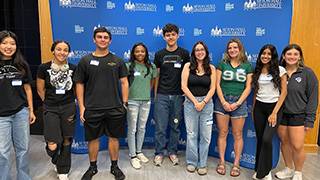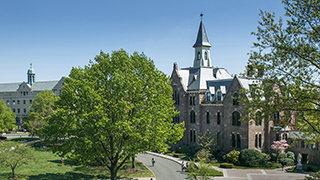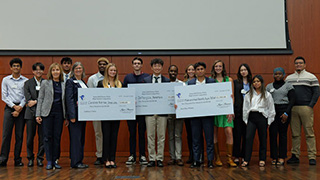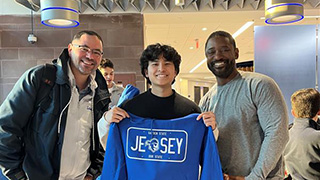The Power of Peer Learning: Seton Hall’s Supplemental Instruction Program
Monday, October 21, 2024
 At Seton Hall University, the Supplemental Instruction (SI) program, supervised by Nicole Paternoster, a certified SI supervisor, and Ted
McCulloch, has become an invaluable resource for students taking some of the most
rigorous courses on campus, including General Biology, General Chemistry and Anatomy
and Physiology (A&P). These foundational courses are required for health science,
pre-med, nursing and related fields, but their demanding content can overwhelm students.
That’s where SI comes in—helping students not only pass but thrive in these challenging
subjects.
At Seton Hall University, the Supplemental Instruction (SI) program, supervised by Nicole Paternoster, a certified SI supervisor, and Ted
McCulloch, has become an invaluable resource for students taking some of the most
rigorous courses on campus, including General Biology, General Chemistry and Anatomy
and Physiology (A&P). These foundational courses are required for health science,
pre-med, nursing and related fields, but their demanding content can overwhelm students.
That’s where SI comes in—helping students not only pass but thrive in these challenging
subjects.
What is Supplemental Instruction (SI)?
SI is not just tutoring. It’s a collaborative, student-centered learning model designed to give students the tools they need to succeed in historically difficult courses. The SI model was first developed in 1973 by Deanna C. Martin at the University of Missouri-Kansas City (UMKC) as a response to high dropout and failure rates in “gatekeeper” courses. These are courses that many students need to progress in their academic careers but often struggle with due to the level of complexity in the material.
Martin’s SI model was not meant to be remedial but rather proactive. It helps students engage deeply with course content in a collaborative group setting, facilitated by SI leaders—students who have already excelled in the course. As Marius Pelmus, general chemistry professor at Seton Hall, explains, “I think that the SI leaders enhance the learning environment by offering the opportunity for the students: (a) to get answers to lecture questions that they might have forgotten to ask during class or were raised after, (b) to practice more problems compared to what they can do in time of the class, (c) to revise high school knowledge.” This peer-to-peer interaction is designed to help students better understand complex topics and build study skills that last far beyond the current semester.
SI in Action: General Biology, General Chemistry and A&P
General Biology I and II
General Biology is one of the first science courses students may encounter at the college level. Topics range from cellular biology to genetics and ecosystems, making it a lot to absorb in a short amount of time. SI leaders, Aditya Kasina, Maddie Jarvis, Mikyah Moore and Sahara John, work with students to break these subjects down into digestible parts, making the information easier to retain. Their sessions aren’t just about reviewing material from the textbook or lectures; they are about fostering a space where students can ask questions, discuss tough concepts and work together to solve problems.
Jason Bundy, who teaches general biology at Seton Hall, emphasized the importance of SI to his students: “Our SI leader is a superstar! Having a peer who did an outstanding job in our course and understands the study skills needed for success is an invaluable resource for my students.” In SI sessions, the focus isn’t just on memorizing facts—it’s about learning to think critically about how biological systems function. Students often work through real-world examples that show how biology applies to everyday life, making the subject more relatable and easier to understand.
General Chemistry I and II
For students tackling General Chemistry, the subject can feel daunting. With complex topics like molecular structures, equilibrium and thermodynamics, students often feel like they are learning a new language. Fortunately, SI leaders like Shajee Jawadi, Grant Berberian, Chris Ivanov and Caroline Kang are experts at making chemistry more approachable. Their sessions focus on helping students break down challenging material into smaller, more manageable pieces. Group problem-solving, hands-on practice with balancing equations and breaking down abstract concepts are just some of the methods they use to help students build confidence in chemistry.
Pelmus speaks highly of the SI program: “I received excellent feedback from my general chemistry students about the SI program. The students got to ask more questions about the lecture and practice problems, especially before the examination lectures. I have very good communication with Shajee, where I share the lecture slides (material that also contains practice problems) and notions that the students might struggle with, and Shajee provides feedback about how the SI sessions went—if some questions came up more often or which were the problems that the students struggled to understand.”
Kristen M. DiGiulio, majoring in biology, shares her experience: “My favorite part about the SI sessions is receiving instruction from a student who was once in my place. Peer support is one of the best services we offer students since there is an increased feeling of community.” The peer-led format fosters an environment where students can learn from someone who has been through the same challenges and come out on the other side.
Anatomy and Physiology I and II
Anatomy and Physiology (A&P) is a critical course for students pursuing healthcare careers, filled with intricate details about anatomical structures and physiological processes. The sheer volume of material can be daunting, but Seton Hall’s SI leaders, including Justine Bennett, Marley Callaway and Joey Ceselka, are there to make it more manageable. They lead study sessions, using tools like anatomical models and diagrams to help students grasp the spatial relationships between different body parts. By working through clinical scenarios, students are better able to retain this complex information and apply it to real-world healthcare situations.
Joey shares his motivation for becoming an SI: “I became a Supplemental Instructor because helping others succeed is incredibly rewarding. Anatomy and physiology is a challenging subject, and having faced difficulties in that course, I know firsthand how tough it can be. That’s why I’m passionate about guiding others through the same obstacles. By sharing the knowledge I’ve gained and breaking down complex topics, I help students thrive and keep myself engaged and continuously learning.”
In A&P sessions, the goal is to make the material less intimidating and more interactive. SI leaders like Joey work to break down challenging concepts and create a collaborative learning environment where students can confidently ask questions, discuss tough material and practice applying their knowledge in a supportive setting. This approach not only helps students pass the course but also builds a solid foundation for future studies and careers in healthcare.
Why SI Matters at Seton Hall
The Supplemental Instruction program at Seton Hall does more than just help students pass their courses—it gives them the tools they need to thrive academically. The peer-led structure provides a safe, collaborative space where students can ask questions without judgment, work through difficult concepts together and build confidence in their abilities. First-year student Sisley Carretas explains why SI has been so helpful: “SI is more of a standard classroom setting compared to a huge lecture hall where you are only a blip in an ocean of students. You have the opportunity to digest and be taught the information of a heavy chapter a second time, which can help you further understand something you did not quite get the first time or help you repeat the information—since repetition is a great way to learn.”
Not only do students benefit, but SI leaders also gain valuable experience. Caroline, an SI leader in general chemistry, shares, “The most rewarding part has definitely been the interactions with my students. I've had a very consistent batch of students show up to my sessions, and over time, I've gotten to learn more about their personalities and motivations. My students have also helped me be more confident with teaching others, so I've been more comfortable sharing my personality with them as well.”
In courses like general biology, general chemistry and anatomy and physiology, SI sessions provide crucial support, helping students navigate challenging material and build lifelong skills that extend beyond the classroom. SI is more than just academic assistance—it’s about making learning accessible, enjoyable and less intimidating for all.
Categories: Campus Life, Education





